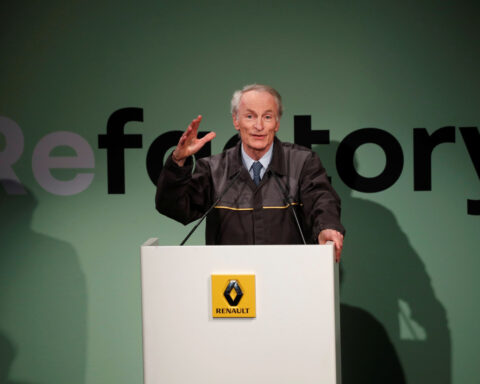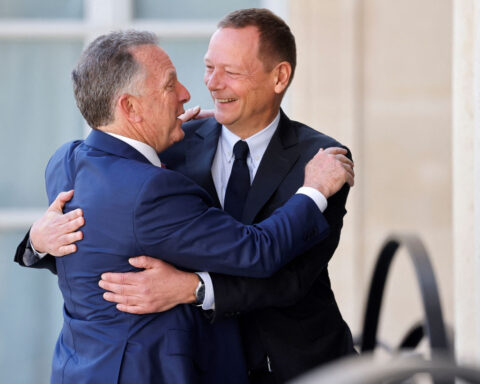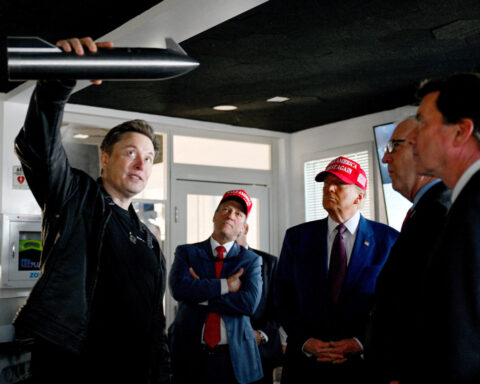Hong Kong (CNN) — Donald Trump’s second term in office is getting off to a good start for China.
The new US president has so far refrained from acting on his threat to slap hefty tariffs on China, told business and political leaders at an economic forum in Davos that the two countries could have a “very good relationship” and reportedly expressed interest in visiting the Chinese capital in the months ahead.
Trump even gave a 75-day reprieve to Chinese-owned app TikTok and signaled he would look to dilute a law requiring the company divest its American business or be banned.
All this adds up to a strong signal that the returning president is willing to talk – and cut deals – with China. At least for now.
That is welcome news for Beijing, which has been bracing for a tumultuous period in US-China relations as Trump stacked his cabinet with China hawks and campaigned on levying high tariffs on all Chinese imports to the US.
“China realizes that’s there an opportunity to negotiate with Trump,” said political scholar Liu Dongshu of the City University of Hong Kong. “And a better US-China relationship is more important to China than to United States … so China is eager” to engage.
Stakes are high for Beijing, as a tit-for-tat trade war like the one during Trump’s last administration would hit China’s ailing export-reliant economy at a bad time. And Chinese leaders have been keen to seize on the opportunity to soften Trump’s hard line.
Xi called for a “new starting point” in US-China ties during a call with Trump days ahead of the inauguration and dispatched Vice President Han Zheng to the US capital to attend the swearing-in ceremony, the seniormost Chinese official ever to attend such an event.
Meanwhile at the World Economic Forum in Davos this week, Vice Premier Ding Xuexiang said China wants to “promote balanced trade,” not “surplus” with the world – striking a note that appeals directly to Trump’s chief complaint about the relationship between the two largest economies.
But China’s policymakers are also under few illusions about how quickly the tenor of US-China relationship could change – and are likely carefully calculating how to use the current breathing room to negotiate with the “art of the deal” president in the months ahead.
Containing the tariff threat?
Looming over this period of tone-setting is a “phase one” trade deal brokered during the last Trump administration.
The 2020 deal marked a truce in a tit-for-tat trade war that saw Trump heighten or impose tariffs on hundreds of billions of Chinese imports to the US – an act he claimed would level the playing field with China and that has largely stayed in place since.
Now that deal, which analysts say Beijing never fully implemented, is part of a larger probe of US-China economic and trade relations that Trump called for in an executive order on his first day in office.
The review will guide whether the White House imposes duties on China but is expected to take months. That gives Beijing time to build a relationship with Trump, entertain him in Beijing or push for a pre-emptive deal to avert more severe economic penalties.
In an interview with Fox News that aired Thursday, Trump described tariffs as a “tremendous power” over China, but said he “would rather not have to use” them and thought the two countries could reach a trade deal. It also remains unclear whether Trump will deepen export controls on sensitive technologies implemented by former President Joe Biden.
“China has realized Trump can be negotiated with, but he is a different, new Trump – what we committed to last time may not satisfy his new desires,” said Shanghai-based foreign affairs analyst Shen Dingli. This time, instead of being “coerced” into a tit-for-tat trade war by Trump, Beijing may do better to “smile, stay calm, and start talking with him,” Shen said.
Tariffs on 10% of Chinese imports into the US could still come as early as next month in retaliation for what Trump described as the role played by Chinese suppliers in America’s fentanyl drug crisis.
But those are a far cry from the 60% duties he campaigned on – and observers of China’s foreign policy say Beijing is likely looking at those threats as levers it could pull to mollify Trump.
For example, Chinese officials could move to implement more of the existing “phase one” deal and further open China’s huge market to foreign firms. They also could take additional actions to stem the export of precursor chemicals used to make the fentanyl.
In China’s domestic debates about foreign policy, many pundits too are advocating dialogue and cooperation on the economy rather than hard lines.
Jia Qingguo, a former dean of Peking University’s prestigious School of International Studies, expressed as much in a recent interview with state-linked financial publication Yicai.
“Rather than adopting a blanket veto of all US proposals,” China should “analyze which issues require opposition and which can be cooperated on based on our own interests,” he said.
If Trump does visit Beijing in the coming months, a trip sources close to the president have suggested he is eyeing, that will also give Beijing a key opportunity to woo the US leader.
‘Must not let our guard down’
But there are also very real limits to how much China can bend toward Trump’s demands – and skepticism within China about how possible it will be to cooperate with his administration. Xi pointed to those in his call with Trump a week ago.
“The important thing is to respect each other’s core interests,” the Chinese leader said, name-checking Taiwan, the self-ruling democracy Beijing claims and has vowed to take control of, as an issue the US needs to treat with “prudence.” On the other hand, there is a “broad space of cooperation” available on other areas, like economic ties, he intimated.
Within China there’s also debate about how the Chinese government should respond if the US president does begin to raise hefty tariffs against Chinese goods – and signs Beijing is preparing for a potential fight.
The country revamped its export control regulations late last year, sharpening its ability to restrict so-called dual-use goods. It’s also already limited the export of certain critical minerals and related technologies that countries rely on to fabricate products from military goods to semiconductors – another kind of leverage Beijing could use to fight tariffs.
Meanwhile, any deal-making between Beijing and Washington will not exist in a vacuum. Rather it will sit amid myriad tensions between the two sides on issues including China’s human rights record, a competition for technological and military dominance, and the balance of power in Asia.
China is unlikely to tamp down on behaviors enflaming those tensions – like its drive to modernize and expand its military and its ramped-up aggression pressing its territorial claims in the South China Sea and over Taiwan. And many US lawmakers on both sides of the aisle, unlike Trump, have given no sign they are willing to work with the country they see as the principal threat to America’s sole superpower status.
On Thursday, for example, lawmakers introduced a bipartisan bill that would revoke China’s preferential trade status with the United States, phase in steep tariffs and end a duty exemption for low-value Chinese imports.
Chinese leaders, too, need to ensure that they look strong in their dealings with the US, both for their domestic audience and countries across the Global South, where Beijing aims to project leadership.
So even as Chinese officials are welcoming overtures from a less combative Trump in week one of his presidency, there’s skepticism within China that those warmer-than-expected signals will last.
“This does not mean that the China-US relationship is any easier; it’s just that the US approach has changed,” Jin Canrong, deputy director of the China-US Research Center at Renmin University in Beijing, said in a video posted on his account on the social media platform Weibo. “We must not let our guard down … the US still views China as a strategic rival.”
The-CNN-Wire
™ & © 2025 Cable News Network, Inc., a Warner Bros. Discovery Company. All rights reserved.

 Trump has begun another trade war. Here's a timeline of how we got here
Trump has begun another trade war. Here's a timeline of how we got here
 Canada's leader laments lost friendship with US in town that sheltered stranded Americans after 9/11
Canada's leader laments lost friendship with US in town that sheltered stranded Americans after 9/11
 Chinese EV giant BYD's fourth-quarter profit leaps 73%
Chinese EV giant BYD's fourth-quarter profit leaps 73%
 You're an American in another land? Prepare to talk about the why and how of Trump 2.0
You're an American in another land? Prepare to talk about the why and how of Trump 2.0
 Chalk talk: Star power, top teams and No. 5 seeds headline the women's March Madness Sweet 16
Chalk talk: Star power, top teams and No. 5 seeds headline the women's March Madness Sweet 16
 Purdue returns to Sweet 16 with 76-62 win over McNeese in March Madness
Purdue returns to Sweet 16 with 76-62 win over McNeese in March Madness







